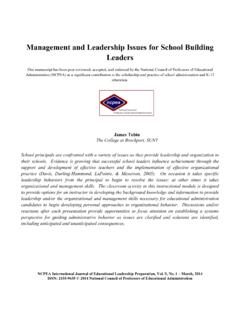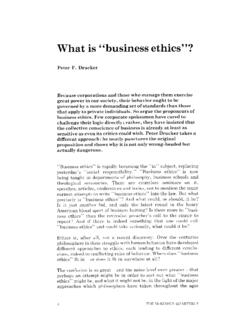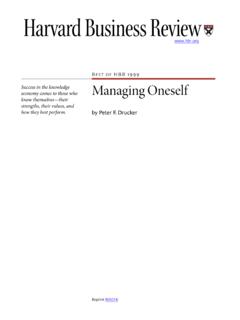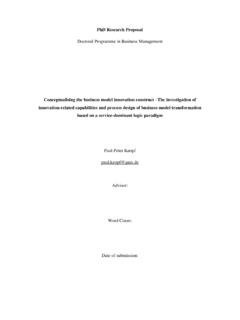Transcription of Unit - 2 : Theories of Entrepreneurship - Dhriiti
1 22 Unit - 2 : Theories of EntrepreneurshipStructure of : Historical Perspectives on Opinion on Emergence of of Assessment completing this unit, you will be able to: Describe the historical perspectives of Entrepreneurship . Point out economical, sociological and psychological view on the emergence of Entrepreneurship . Understand various Theories of Entrepreneurship propounded by various eminent authors. Focus on various multitudes of factors which influence Entrepreneurship . Study and analyze global impact of Entrepreneurship . Explain and correlate various Theories from your own point of view. Understand Entrepreneurship as multi dimensional : Historical Perspectives on EntrepreneurshipThe definition of Entrepreneurship involves creation of value through fusion of capital, risk taking, technologyand human talent.
2 It is a multidimensional concept. The distinctive features of Entrepreneurship over theyears are: Innovation, A Function of high achievement, Organisation building, Group level activities, Managerial skills and leadership, Gap filling activity Entrepreneurship An emerging Scientist, theory refers to the relationships between facts. In another words, theory is some orderingprinciples. There are various Theories of Entrepreneurship which may be explained from the viewpoints ofeconomists, sociologists and psychologists. These Theories have been supported and given by various thinkersover a period of more than two and half centuries.
3 Let s understand the Historical perspective ofEntrepreneurship in Figure :23 Figure : Time table of the Development of Entrepreneurship TheoryAlthough the current popularity of entrepreneurial exploits would tend to make you think that it is a twentiethor twenty first century phenomenon, but it s not like this. Early in the eighteenth century, the French termentrepreneur was first used to describe a go-between or a between-taker. Richard Cantillon, a notedeconomist and reknowned author in the 1700s, is regarded by many as the originator of theEarly1700sLate1700sRichard Cantillon (economist)coined term entrepreneur( go-between or between-taker )Entrepreneur bears risks and plans, supervises organizes and owns factors of production1803 Late1800sJean Baptiste Say (economist) proposed that the profits of Entrepreneurship were separate from profits of capital ownershipDistinction made between those who supplied funds and earned interest and those who profited from entrepreneurial abilities1934 Joseph schumpeter (economist)
4 Described entrepreneur as someone who is an innovator and someone who creatively destructs EighteenthCenturyEighteenthCenturyNinete enthCenturyEighteenthCenturyEighteenthCe nturyTwenty FirstCenturyPeter drucker (Management author) described the entrepreneur as someone who maximizes opportunity2004-101964As technology changes and global connectivity improves, Entrepreneurship means that the entrepreneur not only has to ensure profits for all stakeholders, he has to fix problems, tap new markets, bring cutting edge ideas to the table, and leadcross-culturalteams. Entrepreneurship has taken on new meaning and greater challenges in the last decades.
5 The real skill is learning how to influence through commitment, loyalty and trust. 24term entrepreneur. Cantillon used the term to refer to a person who took an active risk-bearing role inpursuing in the eighteenth century, the concept of Entrepreneurship was expanded to include not only the bearingof risks but also the planning, supervis ing, organizing, and even owning the factors of production. Thenineteenth century was a fertile time for entrepreneurial activity because technological advances during theindustrial revolution provided the impetus for continued inventions and innovations. Then, toward the end ofthe nineteen century, the concept of Entrepreneurship changed slightly again to distinguish between thosewho supplied funds and earned interest and those who profited from entrepreneurial the early part of the twentieth century, Entrepreneurship was still believed to be distinct and differentfrom the management of organizations.
6 However, in the mid-1930s the concept of Entrepreneurship s when economist Joseph Schumpeter proposed that Entrepreneurship involved innovations and untriedtechnologies or what he called creative destruction, which is defined as the process whereby existing products,processes, ideas, and businesses are replaced with better ones. Schumpeter believed that through theprocess of creative destruction, old and outdated approaches and products were replaced with betterones. Through the destruction of the old came the creation of the new. He also believed that entrepreneurswere the driving forces behind this process of creative destruction.
7 They were the ones who took thebreakthrough ideas and innovations into the marketplace. Schumpeter s description of the process of creativedestruction served to highlight further the important role that innovation plays in Entrepreneurship . As ourearlier definition of Entrepreneurship showed, the concepts of innovation and uniqueness are (and alwayshave been) integral parts of entrepreneurial final development from the twenti eth century we ll look at is peter drucker s contention thatentrepreneurship involves maximizing opportunities. drucker is a well known and prolific writer on a widevariety of management issues. What his perspective added to the concept of Entrepreneurship is thatentrepreneurs recognize and act on opportunities.
8 drucker proposed that Entrepreneurship doesn t justhappen out of the blue but arises in response to what the entrepreneur sees as untapped and .we ve looked at only a small portion of Entrepreneurship s long and colourful past, keep in mindthat the history of Entrepreneurship continues to unfold. Its history is still being written today. In the earlyyears of the twenty-first century, researchers continue to study entrepreneurs and Entrepreneurship . Althoughno generally accepted theory of Entrepreneurship has emerged from these Opinion on Emergence of EntrepreneurshipThe concept of Entrepreneurship has undergone major changes over more than two and half centuries.
9 Yetthe concept of Entrepreneurship is not clear. As the concept of Entrepreneurship is complex in its content, itis influenced by not only economical aspects, but also by sociological, psychological, ethical, religious andcultural values. Over the years the social scientists have interpreted the phenomenon of entrepreneurshipdifferently in accordance with their perception and economic environment. We can identify five stages in theevolution of Entrepreneurship as shown in figure :25 Figure : Stage in Evolution of EntrepreneurshipJoseph Massie observes, However, because of the diversity of approaches to the study of Entrepreneurship ,there is difficulty in defining just what Entrepreneurship is and identifying just who is an entrepreneur.
10 Thereare different opinions on the emergence of Entrepreneurship . These opinions may be classified into threecategories:A. Economist s viewB. Sociologist s viewC. Psychologist s viewA. Economist s ViewEntrepreneur and Entrepreneurship have been a point of interest to economics as early as 1755. The termentrepreneur seems to have been introduced into economics by Cantillon, but the entrepreneur was firstaccorded prominence by Say. It was variously translated into English as merchant , adventurer and employer , though the precise meaning is the undertaker of a project. James Stuart Mill popularised theterm in concept wasvague, wide and not clear.








